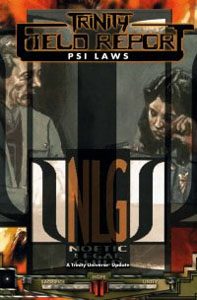 Tagline: The Trinity Field Reports continue to be one of the best elements of the Trinity line.
Tagline: The Trinity Field Reports continue to be one of the best elements of the Trinity line.
Since Dungeons & Dragons first appeared on the market over twenty-five years ago the vast majority of roleplaying games have shared a standard motif in which the roles that the player’s assume are always (and I mean always) individuals who spend 99% of their time together in what is essentially a gang, wandering around, and engaging in thinly rationalized acts of violence. It has been interesting to watch over the past few years as the seemingly inevitable backlash against this ideology has slowly materialized. The backlash, in fact, has almost reached the point where it is fashionable to include it as a disclaimer – even when doing so is patently absurd. (For example Unknown Armies includes the disclaimer that people who “follow this type of logic” usually end up in insane asylums… just before describing a game in which the players take on the role of people who believe that they can perform magic. Violence, I guess, gets you locked up a in a nuthouse. Thinking that you get magical powers through self-mutilation is perfectly normal.)
That being said, it’s not that bad a trend. Even if you aren’t looking to get your games completely bogged down in real world causalities (what fun would a Feng Shui campaign be, for example, if your PCs were always worrying about civil suits?), such things can occasionally be used to add an original twist to an old story. Take the storyline in the Flash comic books a couple years back, for example, in which the Flash is put on trial for failing to save someone from a fire. That’s clever. Or take the brilliancy of Frank Miller’s The Dark Knight Returns. Normally you just quietly ignore the fact that Batman is an unlicensed vigilante; Miller explores the concept (along with others) and creates something fresh and creative. (Costumed superheroes make an excellent example of this because so many realities are quietly put on hold in the genre; bring one or all of those realities back into play and you have a whole new playing field to explore.)
All of which brings us around to Trinity Field Report: Psi Laws. This is a product which probably never would have existed fifteen years ago, because the only question it asks is: If your main characters use their psionic abilities, what are the legal ramifications?
I’ve commented before on the greatness of the Field Report concept. It allows Andrew Bates to deal with concepts, fill holes, and correct sizable mistakes which just couldn’t be handled any other way. These are things which could not be expanded effectively to fill a full-sized sourcebook, but of such a nature that they cannot be incorporated into another product in a convenient matter (or, in one case, something which should have been included in a product but was not – letting them correct the mistake in as clean a manner as possible). Their unique, cheap nature means that the Trinity universe can be fleshed out in ways other universes cannot.
Psi Laws is an excellent example of this. Giving both the GM and the player (due to their format as field reports to Aeon Trinity agents) a general overview of the way psions are treated by laws in all the major areas of the Trinity setting – and, through inference, the way law functions in general two centuries in the future — Psi Laws gives Trinity something no other science fiction setting has: Laws. Most games simply assume (or rather, let you assume) that the laws of their future realities will be, for all intents and purposes, identical to those of 20th century America. It’s an interesting oversight considering that the laws of today are substantially different from the laws of twenty years ago… let alone a hundred or two hundred years ago. Often these future settings have new technologies and new societies, but no conceptual base for how the law has changed over the years. This is a particular oversight in settings where the PCs end up being law enforcers of one variety or another.
Taking all of that into consideration I can give Psi Laws the same high recommendation I’ve given the other Field Guides — this is $5 well spent.
(Psi Laws does contain one serious mistake where a block of text was apparently pasted into the wrong place (it appears in its correct place as well father down the page). I also have reservations about the cover – a blow up of an interior image which is severely pixellated. These are minor concerns, however.)
Style: 5
Substance: 5
Author: Bryant Durrell
Company/Publisher: White Wolf
Cost: $4.95
Page count: 25
ISBN: 1-56504-769-9
Originally Posted: 1999/04/26
For an explanation of where these reviews came from and why you can no longer find them at RPGNet, click here.












It’s reviews like this that make me glad you’re reposting these here. I wrote a multi-part article on my blog a while back generalizing what laws would be like in a typical D&D/Pathfinder campaign, and it was a very fun and thought-provoking exercise. For a professional product to explore the same themes (albeit for a sci-fi setting) is something I can’t wait to check out; much thanks for bringing it to my attention!